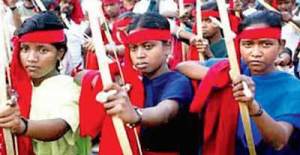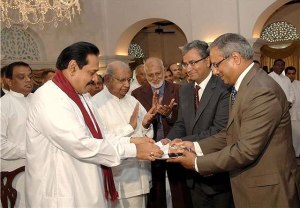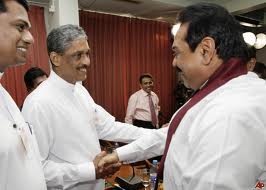What is the biggest threat to India’s security? You could think of further terrorist operations orchestrated by their arch-enemy Pakistan, the so called containment strategy of China with the String of Pearls, but no, you would be wrong. Surely the Indian armed forces and the RAW, the secret service are taking into account these issues as future menaces. But the current, biggest threat to internal security is the Maoist guerilla of the Naxalites, which count amongst its file indigenous warriors armed with bows and arrows. Members of the Adivasis, the indigenous ethnicity of India, more than 80 millions, are fighting back against the oppression by the central government and joined the Maoist militia in several states. The some of the Adivasis are tired of being discriminated and most of all expropriated of their land rights.
And New Delhi, the biggest democracy of the world, the strong ally of the good Western government amongst the dodgy, authoritarian Asian states, responded with a responsible, measured, contained military operations, called Green Hunt. In collaboration with the regular forces there are also paramilitary troupes, funded by private stakeholders. These are the best practices exported by the USA during the Afghanistan and Iraq wars and we should admire the consistency of India in aligning itself with the best Western policies.
You may ask why the Indian government is so upset with indigenous populations, who lived for millennia in their forest, with unchanged habits and astonishingly sustainable behaviour, why they are fighting these groups rather than picking them up as global models? Easy to answer, it is the case that they live where there are enormous reserve of metals and minerals. And given the needs of the growing Indian economy and the worldwide prices, many companies are salivating at the idea of grabbing those mines. In particular the giant Vedanta secured vast concessions. And they want to exploit them, so they supported this massive campaign to evict the Adivasis from their property.
A generous offer of consulting about the matters arrived from Sri Lanka. Gotabaya Rajapaksa, brother of the president Mahinda and plenipotentiary minister of Defence, not to mention acclaimed leader of the army and potential war criminal for the massacres of 2009, offered his help1.
Mr Rajapaksa exposed his rationale: we have matured an extensive experience in counter-insurgency and we learned how to deal with fighters mingled with civilians. You have only to control the media and position yourself wisely in the international scenario, then you can do whatever you want. Seriously, you can slaughter hundreds of thousands (yes, around 3 times the victims in Sirya) of civilians and nobody will mind your business.
If you think that I’m exaggerating, many Indian commentators thoroughly studied the Rajapaksas’ strategy and compiled a brief guideline that is precisely mentioning control over the media, international relations and steel determination to achieve the goal, regardless of civilian casualties2.
Finally Rajapaksa can offer an already integrated plan of action: Sri Lankan and Indian forces not only conducted joint operations in the past. During the IV Eelam war, military officer from the Indian forces were actually on the field, monitoring, observing, advising and cooperating with the Sri Lanka’s Army. New Delhi is perfectly aware of what happened in 2009 and the fate of the so called “brethren” Tamil. Tamil Nadu politics is based on the support to the Tamils on the other side of the Strait. At least this is the main characteristic of one of the most important politician, Mr Karunanidhi, who was Chief Minister of Tamil Nadu during the final days of the war and who didn’t move a finger to safe his beloved bretheren because was involved in a massive scandal of corruption.
In a matter of days, India answered, that, yes, they are quite interested in the Sri Lankan offer to train them on counter-insurgency. Quoting Gen. Singh: “With significant experience on both sides, we have a lot to learn each other and we look forward to reinforcing our cooperation in the military domain further”3.
A final note: in the Mannar Basin, offshore from the coast controlled by the LTTE and scenario of the massive, brutal counter-offensive of the Sri Lankan army, in which almost 440 000 civilians have been chased like wild animals for months, it has been found oil.
And guess who is taking control of those oil field? You’ll never get it. It’s Vedanta again!
So Vedanta is conducting paramilitary operations in India to evict Adivasis, and then it turned to Sri Lanka to expropriate the Tamils because of the oil, using the ruthless Rajapaksa regime as (happy) executioner of the dirty job. If it was a Hollywood movie, you had say that the figure of the evil company exploiting natural resources and killing poor indigenous would have been too clichè to be true. As usual reality is more surprising than fiction, much more.
















